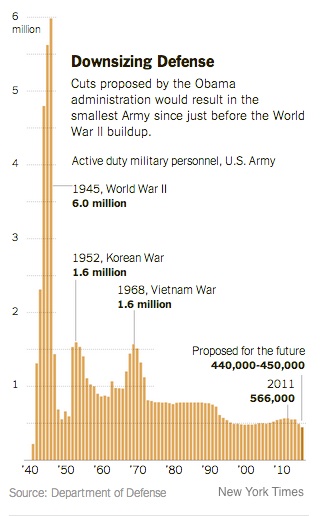The U.S. is not regressing to a 'pre-World War II' army
Defense Secretary Chuck Hagel is taking on the military-industrial complex, but he's hardly leaving America defenseless


A free daily email with the biggest news stories of the day – and the best features from TheWeek.com
You are now subscribed
Your newsletter sign-up was successful
Defense Secretary Chuck Hagel is taking on the military-industrial complex. It is a daunting task. Before he even released his Pentagon budget blueprint on Monday, the combined forces of Congress, defense contractors, and various other interests were already preparing to defend their slices of the massive defense pie.

That's a pretty eye-grabbing statistic: The lowest troop levels since before World War II. But it's also a pretty misleading one. First, the U.S. active-duty troop levels are already scheduled to fall to 490,000. More importantly, the U.S. isn't the same institution as it was in 1940, and troop levels are much less important now than they were 70 years ago.
In 1940, the U.S. was a growing world power, but it was hardly a superpower. Japan was taking a calculated risk in attacking Pearl Harbor, but it wasn't as crazy a move as it sounds like today. Britain was a mighty empire. Germany came close to taking over much of the world, with help from Italy. There were no nuclear weapons, and certainly no unmanned, missile-equipped aerial drones.
The Week
Escape your echo chamber. Get the facts behind the news, plus analysis from multiple perspectives.

Sign up for The Week's Free Newsletters
From our morning news briefing to a weekly Good News Newsletter, get the best of The Week delivered directly to your inbox.
From our morning news briefing to a weekly Good News Newsletter, get the best of The Week delivered directly to your inbox.
Here's another way of looking at Hagel's budget: In 1940, U.S. defense spending was $1.7 billion, or 1.3 percent of GDP; in 2011, it was $705.6 billion, or 4.7 percent of GDP. Hagel's budget proposes lowering defense spending to $496 billion — the cap in last December's bipartisan budget deal, or about 2.7 percent of GDP. America would still be spending more than twice as much on defense as it did in 1940, as a percentage of GDP.
That's not to say this isn't a significant reduction in U.S. defense spending. The proposed budget zeros out the Air Force A-10 "Warthog" fighter jet program and retires the U-2 spy plane, along with other cuts, possibly including Marine Corps and Army combat vehicles and other aircraft. More significantly, the budget is geared toward a U.S. military that can decisively fight one war and hold off an enemy on a second front, rather than the Cold War strategy of being able to fight two wars simultaneously.
"You have to always keep your institution prepared, but you can't carry a large land-war Defense Department when there is no large land war," an unidentified senior Pentagon official tells The New York Times.
Of course, the budget will face stiff resistance from defense contractors whose programs are facing cuts, the members of Congress where those programs are located, and various members of the military and veterans' groups.
A free daily email with the biggest news stories of the day – and the best features from TheWeek.com
"This is a real uphill battle with Congress," Mieke Eoyang, director of the National Security Program at centrist think tank Third Way, tells The Wall Street Journal. "God bless [Hagel] for trying to get a handle on these costs.... But in this political environment, in an election year, it's going to be hard for members of Congress to accept anything that's viewed as taking benefits away from troops."
Peter has worked as a news and culture writer and editor at The Week since the site's launch in 2008. He covers politics, world affairs, religion and cultural currents. His journalism career began as a copy editor at a financial newswire and has included editorial positions at The New York Times Magazine, Facts on File, and Oregon State University.
